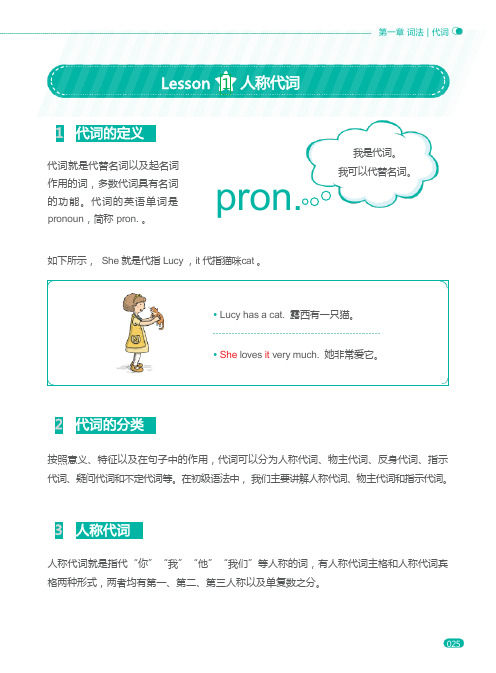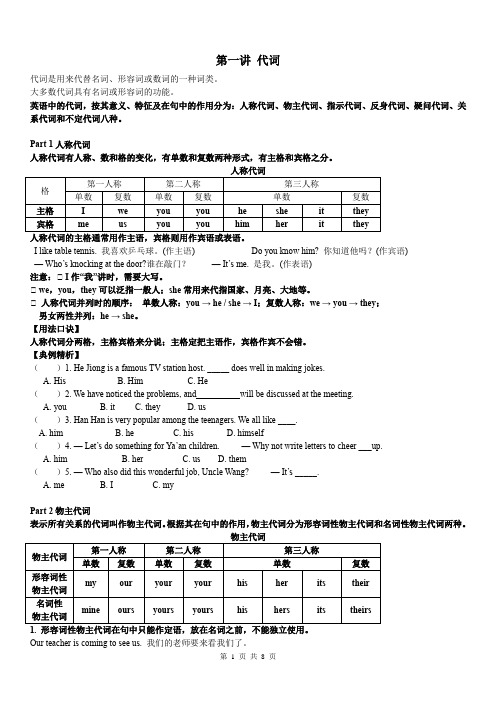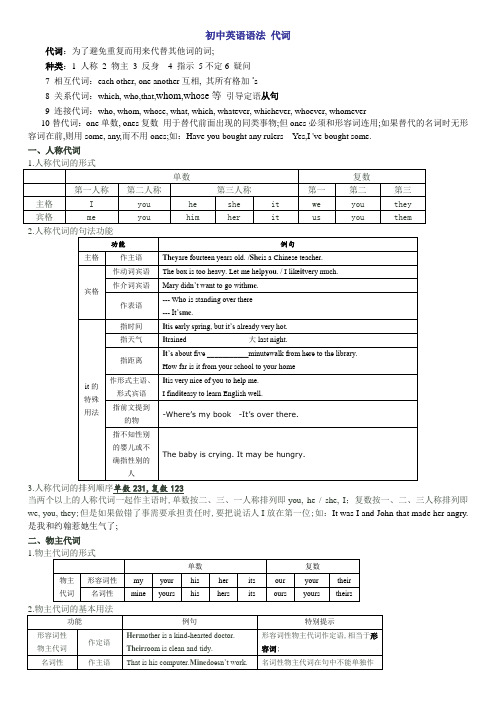初中英语代词讲义-(8.21)
初中英语代词讲义

初中英语代词讲义-CAL-FENGHAI.-(YICAI)-Company One1第一讲、代词从前有一个家族“物主代词”,但因为意见不同,这个家族分裂成两个小家族,一个叫形形,一个叫名名。
他们长相相似但略有不同。
形形家的人胆子小,出门得有保镖跟着(用法:修饰名词),名名家的人胆子大,出门不用保镖(用法:不接名词)。
再细致的看,大部分名名家的人比形形家的头发长又卷(即加了 s),比如:your 和 yours,her 和 hers,our 和 ours,their 和 theirs;同时还有两对双胞胎,his 和 its;只有一个人特别爱美做了整容,my 整成了 mine。
有一天大族长“代词”,召集所有的家族来开会,我们一起来看看,不同代词之间的关系又是怎样的呢?一、人称代词二、物主代词三、指示代词this 这,这个; that 那,那个; these 这些; those 那些。
1. this和these一般用来指在时间或空间上较近的事物或人,that和those则指时间和空间上较远的事物或人,例如:This is a pen and that is a pencil.We are busy these days.In those days the workers had a hard time.2. 有时that和those指前面讲到过的事物,this 和these则是指下面将要讲到的事物,例如:I had a cold. That's why I didn't come.What I want to say is this : pronunciation is very important in learning English.3. 有时为了避免重复提到的名词,常可用that或those代替,例如:Television sets made in Beijing are just as good as those made in Shanghai.4. this 在电话用语中代表自己,that 则代表对方。
八年级下册英语代词用法总结

八年级下册英语代词用法总结一、人称代词1. 主格人称代词:用于代替句子的主语,例如:I, you, he, she, it, we, they。
2. 宾格人称代词:用于代替句子的宾语,例如:me, you, him, her, it, us, them。
3. 形容词性物主代词:用于表示所属关系,例如:my, your, his, her, its, our, their。
4. 名词性物主代词:直接代替名词,例如:mine, yours, his, hers, its, ours, theirs。
5. 反身代词:表示动作的承受者与动作的执行者是同一人,例如:myself, yourself, himself, herself, itself, ourselves, yourselves, themselves。
二、指示代词1. this: 用于指示近处的人或物,在单数形式中,例如:this book。
2. that: 用于指示远处的人或物,在单数形式中,例如:that car。
3. these: 用于指示近处的人或物,在复数形式中,例如:these books。
4. those: 用于指示远处的人或物,在复数形式中,例如:those cars。
三、疑问代词1. who: 用于询问人,在主语位置或宾语位置,例如:Who is she? Who did you see?2. whom: 用于询问人,在宾语位置,例如:Whom did she visit? Whom do you love?3. whose: 用于询问所属关系,例如:Whose book is this?4. what: 用于询问事物、情况或事件,在主语位置或宾语位置,例如:What is it? What did you do?四、不定代词1. all: 全部,例如:All students must attend the meeting.2. some: 一些,例如:Some people like to travel.3. any: 任何,例如:I don't have any money.4. each: 每个,例如:Each student should prepare for the exam.5. few: 很少,几乎没有,例如:Few students arrived on time.6. many: 许多,例如:Many people enjoy playing sports.7. both: 两个都,例如:Both books are interesting.8. either: 任何一个,两个中的任意一个,例如:You can choose either book.9. neither: 两个都不,两个中的任何一个都不,例如:Neither option is suitable.五、反意疑问句1. 否定句的反意疑问句:将肯定回答期望,将否定回答否定,例如:You don't like ice cream, do you? Yes, I do. / No, I don't.2. 肯定句的反意疑问句:将否定回答期望,将肯定回答否定,例如:You like ice cream, don't you? Yes, I do. / No, I don't.以上是八年级下册英语代词的用法总结。
《初级英语语法之代词篇》课程讲义

如下所示, She 就是代指 Lucy ,it 代指猫咪cat 。
• Lucy has a cat. 露西有一只猫。
• She loves it very much. 她非常爱它。
按照意义、特征以及在句子中的作用,代词可以分为人称代词、物主代词、反身代词、指示 代词、疑问代词和不定代词等。
在初级语法中, 我们主要讲解人称代词、物主代词和指示代词。
人称代词就是指代“你”“我”“他”“我们”等人称的词,有人称代词主格和人称代词宾 格两种形式,两者均有第一、第二、第三人称以及单复数之分。
我是代词。
我可以代替名词。
1代词就是代替名词以及起名词 作用的词,多数代词具有名词 的功能。
代词的英语单词是pronoun ,简称 pron. 。
pron.第一章 词法 | 代词英语初级语法人称代词主格是指在句子中作主语的人称,各人称与单复数总结如下:第一人称人称代词主格我 I我们 we你 you你们 you他 / 她 / 它 he /she /it他们 / 她们 / 它们 they• They are playing. 他们正在玩。
• She is jumping. 她正在跳。
上面两个例子中,大家注意到人称代词后面的词有什么区别吗?为什么第一个用 are ,第二 个用 is 呢?原来它们是不同的 be 动词。
英语中的 be 动词有 am 、 is 、are 三种形态,相当于中文里的“是”。
be 动词的使用要与 人称代词保持一致,即 am 用于第一人称单数 I 的后面; is 用于第三人称单数 he/she/it 的 后面; are 用于第二人称与各人称复数 you/we/they 的后面。
• is 跟着他 (he) 她 (she) 它 (it) • 单数 is • 复数 are我 (I) 用 am 你 (you) 用 are• • 第三人称第二人称第一章 词法 |代词(1) 人称代词宾格是指在句子中作宾语的人称。
比如,下面两个句子中都有“我”,但用法 不一样。
初中英语语法代词讲解

初中英语语法代词讲解文档编制序号:[KKIDT-LLE0828-LLETD298-POI08]初中英语语法代词代词:为了避免重复而用来代替其他词的词。
种类:1) 人称 2) 物主 3) 反身4) 指示 5)不定6) 疑问7) 相互代词:each other, one another互相,其所有格加-’s8) 关系代词:which, who,that,whom,whose等引导定语从句9) 连接代词:who, whom, whose, what, which, whatever, whichever, whoever, whomever10)替代词:one(单数), ones(复数)用于替代前面出现的同类事物。
但ones必须和形容词连用。
如果替代的名词时无形容词在前,则用some, any,而不用ones。
如:Have you bought any rulers Yes,I 've bought some.一、人称代词1.人称代词的形式2.人称代词的句法功能3.人称代词的排列顺序(单数231,复数123)当两个以上的人称代词一起作主语时,单数按二、三、一人称排列(即you, he / she, I);复数按一、二、三人称排列(即we, you, they)。
但是如果做错了事需要承担责任时,要把说话人(I)放在第一位。
如:It was I and John that made her angry. 是我和约翰惹她生气了。
二、物主代词1.物主代词的形式2.物主代词的基本用法3.物主代词的特殊用法在双重所有格中只能用名词性物主代词。
如:我的一个朋友a friend of mine ,她的一个同学 a classmate of hers , each brother of his.三、反身代词1.反身代词的形式反身代词又叫自身代词,表示动作返回到动作发出者本身。
2.反身代词的句法功能3.由反身代词构成的习惯用语①help oneself to 随便吃……②come to oneself 苏醒过来,醒悟,恢复知觉③dress oneself 自己穿衣服④say to oneself 自言自语⑤enjoy oneself 玩得开心⑥lose oneself in迷路于,全神贯注于…之中,消失于⑦teach oneself 自学⑧look after oneself ⑨by oneself 亲自learn……by oneself 自学…leave one by oneself 把某人单独留下hurt oneself 伤了自己make yourself/yourselves at home 不必拘束四、指示代词1. that 用来代替前面提到的不可数名词,those代替复数名词。
初中英语讲义《代词》

第一讲代词代词是用来代替名词、形容词或数词的一种词类。
大多数代词具有名词或形容词的功能。
英语中的代词,按其意义、特征及在句中的作用分为:人称代词、物主代词、指示代词、反身代词、疑问代词、关系代词和不定代词八种。
Part 1人称代词人称代词有人称、数和格的变化,有单数和复数两种形式,有主格和宾格之分。
人称代词的主格通常用作主语,宾格则用作宾语或表语。
I like table tennis. 我喜欢乒乓球。
(作主语) Do you know him? 你知道他吗?(作宾语)— Who’s knocking at the door?谁在敲门?— It’s me. 是我。
(作表语)注意:⑴ I作“我”讲时,需要大写。
⑴ we,you,they可以泛指一般人;she常用来代指国家、月亮、大地等。
⑴ 人称代词并列时的顺序:单数人称:you → he / she → I;复数人称:we → you → they;男女两性并列:he → she。
【用法口诀】人称代词分两格,主格宾格来分说;主格定把主语作,宾格作宾不会错。
【典例精析】()1. He Jiong is a famous TV station host. _____ does well in making jokes.A. HisB. HimC. He()2. We have noticed the problems, and will be discussed at the meeting.A. youB. itC. theyD. us()3. Han Han is very popular among the teenagers. We all like ____.A. himB. heC. hisD. himself()4. — Let’s do something for Ya’an children. — Why not write letters to cheer ___up.A. himB. herC. usD. them()5. — Who also did this wonderful job, Uncle Wang? — It’s _____.A. meB. IC. myPart 2物主代词表示所有关系的代词叫作物主代词。
初中英语语法代词讲解

初中英语语法代词代词:为了避免重复而用来代替其他词的词;种类:1 人称2 物主3 反身 4 指示5不定6 疑问7 相互代词:each other, one another互相, 其所有格加-’s8 关系代词:which, who,that,whom,whose等引导定语从句9 连接代词:who, whom, whose, what, which, whatever, whichever, whoever, whomever10替代词:one单数, ones复数用于替代前面出现的同类事物;但ones必须和形容词连用;如果替代的名词时无形容词在前,则用some, any,而不用ones;如:Have you bought any rulers Yes,I 've bought some.一、人称代词2.3.人称代词的排列顺序单数231,复数123当两个以上的人称代词一起作主语时,单数按二、三、一人称排列即you, he / she, I;复数按一、二、三人称排列即we, you, they;但是如果做错了事需要承担责任时,要把说话人I放在第一位;如:It was I and John that made her angry. 是我和约翰惹她生气了;二、物主代词1.3.物主代词的特殊用法在双重所有格中只能用名词性物主代词;如:我的一个朋友a friend of mine ,她的一个同学 a classmate of hers ,each brother of his. 三、反身代词 1.反身代词的形式3.由反身代词构成的习惯用语①help oneself to 随便吃……②come to oneself 苏醒过来,醒悟,恢复知觉 ③dress oneself 自己穿衣服 ④say to oneself 自言自语⑤enjoy oneself 玩得开心⑥lose oneself in 迷路于,全神贯注于…之中,消失于 ⑦teach oneself自学 ⑧look after oneself ⑨by oneself 亲自learn ……by oneself 自学… leave one by oneself 把某人单独留下 hurt oneself 伤了自己 make yourself/yourselves at home 不必拘束 四、指示代词1. that 用来代替前面提到的不可数名词,those 代替复数名词;The weather today is finer than that yesterday.The students in this school are different from those in that one.2. 打电话时,用that 询问对方是谁,用this 介绍自己;This is Jack speaking. Is that Mrs Black speaking说明:That 和those 可作定语从句的先行词,但this 和 these 不能,同时,在作先行词时,只有those 可指人,试比较:对 He admired that which looked beautiful. 他赞赏外表漂亮的东西;对 He admired those who looked beautiful. 他赞赏那些外表漂亮的人;those 指人 错 He admired that who danced well. that 作宾语时不能指人对 He admired those who danced well. 他赞赏跳舞好的人;those 指人对 He admired those which looked beautiful. 他赞赏那些外表漂亮的东西;those 指物五、疑问代词疑问代词有who,whom,whose,what 和which 等;在句子中用来构成特殊疑问句;疑问代词都可用作连接代词,引导名词性从句主语从句、宾语从句和表语从句如:说明1:无论是做疑问代词还是限定词,which 和 what 所指的范围不同;what 所指的范围是无限的,而which 则指在一定的范围内,例如:Which girls do you like best 你喜欢哪几个姑娘 What girls do you like best 你喜欢什么样的姑娘说明2:Whom 是who 的宾格,在书面语中,它作动词宾语或介词宾语,在口语中作宾语时,可用who 代替,但在介词后只能用whom, 例如:Whom did you meet on the street 你在街上遇到了谁作动词宾语Whom are you taking the book to 你要把这书带给谁作介词宾语,置句首To whom did you speak on the campus 你在校园里和谁讲话了作介词宾语,置介词后,不能用who 取代; 六、不定代词:不是指明代替任何特定名词的代词叫做不定代词;常见的不定代词有a11,both,each,every等,以及含有some-,any-,no-等的合成代词,如anybody, something,no one;这些不定代词大都可以代替名词和形容词,在句中作主语、宾语、表语和定语, 但none 和由some,any,no 等构成的复合不定代词只能作主语、宾语或表语;every 和no 只能作定语;如:-- Do you have a car --你有一辆小汽车吗 -- Yes,I have one. --是的,我有一辆;辨析:1. one,that 和itone表示泛指,that和it 表示特指;that与所指名词为同类,但不是同一个,而it 与所指名词为同一个;I can't find my hat. I think I must buy one.不定我找不到我的帽子了;我想我该去买一顶;The hat you bought is bigger than that I bought.同类但不同个你买的那顶帽子比我买的大;I can't find my hat. I don' t know where I put it.同一物我找不到我的帽子;我不知道我把它放在哪了;2. .anyone/any oneanyone仅指人,any one既可指人,也可指物;one/nobody, none和noa none 后跟of短语,既可指人又可指物,而no one只单独使用,只指人;None of you could lift it. 你们中没有人可举起它;-- Did any one call me up just now--刚才有人打电话给我吗-- No one.--没有;b none用法相当于名词,一般作主语、宾语; 作主语,谓语动词用单,复数均可,而no one作主语谓语动词只能是单数;None of the problems is/ are easy to solve. None of the milk was left.c no one一般回答who,含anyone,anybody的疑问句;Is there anyone in the room – No one.none回答how many/much及含any+名词的疑问句;How many students are there in the classroom – None.How much money do you have – None.Is there any water in the bottle -None.dno只有形容词性质,修饰不可数或可数名词;no=not any eg. There are no books for her.no=not a 用于连系动词后,语气很强; The girl was no beauty. 这姑娘才不漂亮呢;no+doing 用于讲稿·警告、命令等标识; No smokingno 可修饰其他句子成分;No boy at the school have ever seen the sea.4. both,either both←→neither both部分否定,neither全部否定;both与复数连用,either与单数连用;Both the boys are clever.两个男孩都很聪明;Either of the two boys is clever. 两个男孩都很聪明;There are flowers on both sides of the street.There are flowers on either side of the street. 路边长满了野花;5. all所有的,全部的人或物,any 任何一个, none 都不; 以上词使用范围为三者以上;none←→all ;all 部分否定,none全部否定;All the flowers are gone.所有的花都谢了;I don't like any of the flowers.这些花我都不喜欢;I like none of the flowers.这些花我都不喜欢;注意:all与none用法一样;跟单数名词,用单数动词;跟复数名词,用复数动词;All of the students are there. 所有的学生都在那;All of the milk is there.所有的牛奶都在那;6. “the”的作用他是帮我的学生之一;He is one of the students who help me. 第一句定语从句与the students 一致;He is the one of the students who helps me. 第二句定语从句与the one 一致;。
初中英语代词课件(精品全面)上课讲义

+名词所有格” ,表示带有部分概念或有一定的感 情色彩。
❖ eg: He is a friend of mine.
二、it的用法
❖ it既是宾格又可以做主格,有时也可以指人。 ❖ 1. 代表前面提到过的事物。如:
代词
( pron.)
一、人称代词、物主代词、反身代词一表清
分类 人称、作用
第一人称
单数 复数
第二人称
单数 复数
第三人称
单数
复数
作用
人称代词
主格
宾格
I we you you he she it they 主语
me us you you him her it them 宾语、表语
物主代词
形容词性
名词性
二、it的用法
❖ 3. 表示时间、距离、天气等。如: It will be sunny tomorrow.
❖ 4. 作形式主语或者形式宾语。如: I found it difficult to learn English well
first. It is impossible for us to learn a foreign
❖ 7. come to oneself苏醒 Soon the lady came to herself.
❖ 8. make oneself + 过去分词,使自己被别人… She did her best to make herself understood.
❖ 9. make yourself at home别客气,让自己像在家一样 Help yourself to some fish. Make yourself at home.
初中英语代词语法知识讲解

himself, herself, itself
复数
ourselves
yourselves
themselves
句法功能
作同位语: 可以做主语或宾语的同位语, 起强调作用。此时反身代词要重读,位置
也比较灵活,可放在主语、宾语之后,也可位于句尾。
I'm afraid I can't help you, and you will have to do it yourself.
作主语?littlealittlefew和和afew区别意义句法功能用法与of搭配代词little几乎没有主语宾语表语定语或状语alittle可修饰比较级修饰或代替不可数名词of后为特指的不可数名词或italittle有一点few没有几个主语宾语表语或定语修饰或代替可数名词复数of后为特指的可数名词复数或themyouusafew有几个pleaseaddalittlesugartothecoffee
one 可以作主语、宾语、表语等,
其复数形式为 ones ,所有格形式为 one's ,反身代词为 oneself.
A. 泛指“人”“一个人”“人们”,表示包括自己在内的总体。这种用法中可以出现
one's 和 oneself 与之呼应。 One has to do one's best. 人总要尽力而为。
如果需承担责任,说话者则把第一人称放在第一位。
You ,she, and I should work together and play together.
I and Li Ming broke the window.
B. 人称代词单独使用时,常用宾格而不是主格。
-I'd like to stay here for another week.
- 1、下载文档前请自行甄别文档内容的完整性,平台不提供额外的编辑、内容补充、找答案等附加服务。
- 2、"仅部分预览"的文档,不可在线预览部分如存在完整性等问题,可反馈申请退款(可完整预览的文档不适用该条件!)。
- 3、如文档侵犯您的权益,请联系客服反馈,我们会尽快为您处理(人工客服工作时间:9:00-18:30)。
代词讲义一.人称代词1. 形式人称代词的五种基本形式:2. 几个人称代词连用时的位置关系:1) 单数人称代词并列作主语时,其顺序为:第二人称-> 第三人称-> 第一人称:you -> he/she/it -> IYou, he and I should return on time.2) 复数人称代词作主语时,其顺序为:第一人称-> 第二人称-> 第三人称:we -> you -> They注意:在下列情况中,第一人称放在前面。
a. 在承认错误,承担责任时,It was I and John that made her angry.是我和约翰惹她生气了。
b. 在长辈对晚辈,长官对下属说话时,如长官为第一人称,如:I and you try to finish it.c. 并列主语只有第一人称和第三人称时,d. 当其他人称代词或名词被定语从句修饰时。
3. 名词性物主代词用作主语时,主谓一致关系:名词性物主代词用作主语时,其后的谓语动词形式应同它所代换的名词形式保持一致。
My shoes are cheap. But his _____ expensive.A. isB. areC. beD. am4. 反身代词的正确写法(单复数的判断)以及所属关系的表示:(1)在使用反身代词时,应注意根据句中的某些词语推断其单复数形式,并注意其正确写法。
Please help _____ to some cakes, children.A. youB. yourselfC. yourselvesD. your“help yourself to some…”是一个固定句式(意为“请随便吃点……”),我们可根据children认定对象为复数。
)(2)在说明“某人自己的”时,不能用反身代词加所有格符号表示,而应用“形容词性物主代词+own+名词”表示。
错:He drove himself’s car to go camping last Sunday.对:He drove his own car to go camping last Sunday.5. 双重所有格:在“数词+名词+of+人称代词”这样的词组中,人称代词应使用名词性物主代词,同of一起构成双重所有格形式。
错:Lucy is a good friend of me.对:Lucy is a good friend of mine.三、不定代词考虑表示“两者”还是“两者以上”:选用不定代词时,首先应根据上下文的关联以及句中某个关键词语对不定代词的限制,考虑其说明“两者”还是“两者以上”的人或物。
如说明“两者”,选用both、either、each或neither。
如说明“两者以上”,选用all、(every)、each或none。
. The twin sisters are both good at math.None of the students in our class wants to go there.考虑表示肯定还是否定:选用不定代词时,还应根据句子意义考虑应该使用表肯定的词语还是表否定的词语。
如说明肯定,使用all、both、either、each或(every)。
如说明否定,使用neither或none。
. None of us wants more because we are all full. other:形容词,其后可带复数名词,如带单数可数名词,其前应加上适当的限定词;another:限定词,其后带单数可数名词;代词,代换上文中提及的可数名词(单数,泛指);the other:限定词,其后可带名词;代词,代换上文中提及的可数名词(单数,定指);others:代词,其后不能带名词,代换上文中提及的可数名词(复数,泛指);the others:代词,其后不能带名词,代换上文中提及的可数名词(复数,定指);注意:限定词同名词之间只能使用other。
两个句式的用法(1)one … the other …一个……另一个注意:使用该句式时,其前应出现说明具体数量的数词two;如出现的数词大于two,one可以根据实际情况调整成其它数词;如出现的数词减去one或调整后的数词后仍大于“1”时,the other应变为the others或“the other + 数词”(两个数词相加应等于所给数词)。
There are two apples here. One is for you, the other is for your sister.There are five apples here. Two are for you, the others are for your sister.There are five apples here. Two are for you, the other three are for your sister.(2)some … others …一些……另一些代词专项练习( ) 1. Open the door, please! It’s .A. IB. myC. meD. mine( ) 2. ______ have known each other for 15 years.A. He and IB. I and HeC. You and himD. You and me ( ) 3. He lost his book. Will you lend him _________.A. youB. yourC. yoursD. yourself( ) 4. Won’t you let________ help youA. I and my friendB. my friend and IC. my friend and meD. me and he( ) 5. “Here is a pair which fits”. “Could I _________”A. put it on B. try on them C. put on them D. try them on ( ) 6. That’s not________, it is ________. I made it ________.A. yours, her, myselfB. yours, mine, myselfC. yours, my, myselfD. you, mine, my( ) 7. The sentence_________ is not wrong.A. himselfB. myselfC. itD. itself( ) 8. The girl dresses_________ when she gets up.A. herB. sheC. himselfD. herself( ) 9. _________ these girls do you knowA. Who areB. Which ofC. WhatD. How many( ) 10. ________ is he He is an economist.A. WhoB. WhomC. WhatD. Which( ) 11. Our feeling was_________.A. the same as theyB. same as theyC. the same as theirsD. same as theirs( ) 12. Who is that boy _________.A. He is a studentB. He is a worker He is her brother D. He is tall( )13. This dinning chair is different from________.A. onesB. yourC. that oneD. that( )14. The population of Shanghai is larger than ________ of Nanjing.A. thatB. oneC. thisD. those( ) 15. Everyone should be careful of ________ pronunciation. A. their B. ones C. our D. his( ) 16. There isn’t________ work for you to do.A. someB. anyC. aD. one( ) 17. Why not try________ local dishes in a downtown restaurantA. someB. anyC. manyD. a little( ) 18. He often helped others; he never thought of _______.A. myselfB. himC. himselfD. me( ) 19. You like this but I like_________.A. thisB. theseC. thoseD. that( ) 20. ________ hat is thisA. Who’sB. WhoseC. WhomD. Who( ) 21. I invited Tom and Jane to dinner, but_______ of them came.A. neitherB. eitherC. bothD. none( ) 22. Is________ here No, Xiao Wang is in the library. A. anybody B. everybody C. somebody D. nobody( ) 23. Is there_______ wrong with your TVA. somethingB. anythingC. nothingD. everything ( ) 24. Both of these are interesting books. You can borrow_____ of them.A. someB. anyC. eitherD. no( ) 25. There are two windows in the room. They _______ face east.A. allB. bothC. everyD. either( ) 26. Here are two dictionaries. You may use _______of them.A. allB. everyC. eachD. either( ) 27. The teacher put__________ the books he could find on the desk.A. allB. anyC. muchD. some( ) 28. ChenBin has read lots of stories by Chinese writers, now he would like to read_______ stories by writers from_______ countries.A. some, anyB. other, otherC. other, someD. some, other( ) 29. I can’t go there. There is__________ bus.A. notB. not anyC. noD. none( ) 30. Let you and_________ do it togetherA. IB. myC. meD. mine( ) 31. I don’t think this is a good idea. Have you any_______ suggestionA. anotherB. the otherC. othersD. other( ) 32. ________ a pity you didn’t see the film.A. It’sB. That’sC. These isD. What’s( ) 33. It was ________who helped me a lot.A. herselfB. sheC. himselfD. her( ) 34. I don’t like playing football,________ does he. A. either B. neither C. none D. so( ) 35. ________ are very good.A. Both theyB. The both boysC. Both of theyD. Both those boys( ) 36. _______ of the three bus lines will take you to the station.A. AllB. EitherC. NeitherD. Both( ) 37. Try to make as_______ mistakes as possible in your homework.A. lessB. littleC. fewerD. few( ) 38. I have ______ money with me. Let me pay for you. A. a little B. little C. a few D. few( ) 39. Not all students go home on holiday, __________ still stay in the school.A. a littleB. noneC. a fewD. few( ) 40. I haven’t _________ money with me, but if you w ant I can give you_________.A. much, manyB. many, littleC. much, someD. any, much( ) 41. That’s the matter between_________.A. I and youB. me and yourC. you and ID. you and me( ) 42. Have you finished_________ homeworkA. yoursB. IC. yourD. you( ) 43. --- This is _______ ruler. Where is _____ --- Oh, ________ is on the desk.A. me, yours, myB. my, your, myC. my, yours, mineD. mine, your, my( ) 44. _________ has some new books. The books are on ________ shelf.A. He, hisB. He, himC. Him, hisD. His, he( ) 45. We want_________ example. This one is not enough.A. the otherB. othersC. otherD. another ( ) 46. “_______ teaches _________ English” “Mrs. Ma________.”A. Who, your, doesB. Who, you, doesC. You, whom, doD. You, whose, is( ) 47. Could you give me _________ waterA. anyB. someC. littleD. many( ) 48. “_________watch is this”“ It’s_________.”A. Whose, yourB. Whose, yoursC. Which, youD. What,yours( ) 49. Most of ________ can read as fluently as ________.A. us, theyB. our, themC. we, themD. ours, theirs( ) 50. He is the boy________ I went swimming yesterday.A. whoB. whomC. with whomD. him( )51. The weather in summer in Wuhan is hotter than _______in Beijing.A. oneB. itC. thatD. this( )52. --- How do you think about the film--- Sorry. _______ of us have seen it.A. SomeB. AnyC. AllD. None( )53. --- Which do you like better, English or Chinese --- _______. I prefer math.A. EitherB. NeitherC. BothD.No one( )54. --- What would you like to drink--- It doesn’t matter. _______ will do.A. SomethingB. NothingC. EverythingD. Anything( )55. --- Shall we meet on Saturday or Sunday --- _______ day is OK.A. AnyB. EitherC. EachD. Every( )56. --- Is this your book--- No, _______ is in my bag. Perhaps it’s _______.A. my, herB. mine, hersC. mine, herD. my, hers( )57. Mr Wang taught _______ English last term.A. weB. usC. ourD.ours( )58. I have two brothers. _______ is a doctor, ______ is a soldier.A. One, the otherB. One, otherC. The one, the otherD. The one, other( )59. His mother did the housework all by _______.A. herB. sheC. hersD. herself ( )60. This pair of trousers is too short. Would you please show me _______ one.A. otherB. othersC. anotherD. the others( )61. Is there _______ in today’s newspaperA. new anythingB. anything newC. new somethingD. new everything( )62. I found _______ important to read English in the morning.A. itB. thatC. itsD. which( )63. --- _______ are you going to visit in Beijing--- We are going to visit the Summer Palace.A. WhereB. WhatC. WhyD. When( )64. He wanted to invite three of _______--- Tom, Mike and _______ to his birthday party.A. we, IB. us, meC. us, ID. we, me( )65. They are twins. _______ of them like English.A. EachB. BothC. AllD. Neither( )66. Your son is old enough to look after _______. You needn’t worry about _______.A. him, himB. himself, himselfC. himself,himD. him, himself( )67. My father keeps some white cows and three black _______.A. oneB. onesC. itD. its( )68. The desks in our classroom are bigger than _______in yours.A. themB. thoseC. onesD.that( )69. --- _______ are you--- Ah, it’s a secret.A. HowB. How manyC. How muchD. How old( )70. _______ sister asks _______ to go to school with_______.A. My, I, sheB. My, me, herC. I, my, sheD. I, me, her( )71. --- Do you have _______ CDs here--- Yes, they are over there.--- May I borrow _______--- Yes, of courseA. some, someB. any, anyC. any, littleD. some, any( )72. They all lost _______ in the beautiful music.A. themB. theirC. theirsD. themselves( )73. Your computer is very different _______.A. to meB. from mineC. for mineD. as me( )74. He wants to know _______ ask about Father Christmas.A. to whoB. to whomC. whose toD.whom to( )75. --- Is that Miss Li speaking--- Yes, this is Miss Li speaking. _______A. Who are youB. Who is heC. Who is sheD.Who is that( )76. There are quite a few old books on the shelf , but_________ of them is useful to him .A. bothB. allC. neitherD.none( )77. The Smiths have visited two famous cities . One is inJapan and _________ is in China A. another B. other C. others D. the other。
